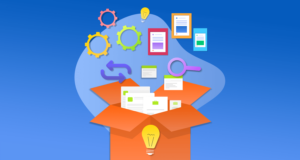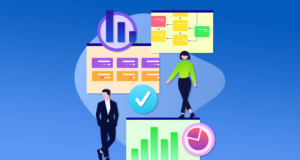Beyond Bitcoin: Leveraging the Power of Blockchain as a Service
Blog Categories:
Published:
November 11, 2023
Reading Time:
6 minutes

When it comes to blockchain, many tend to think of bitcoin. However, the potential of blockchain technology has gone well beyond it. There are many non-monetary applications of blockchain.
They range from securities settlement, supply chain, human resources management to healthcare, data management and decision making.
Examples of blockchain can be various. Dubai has set the goal to become the world’s first blockchain-powered government. Shipping giant DHL is among many logistics leaders that launched their digital ledgers using blockchain.
However, the complexity of the blockchain system makes the development, maintenance and monitoring very expensive due to its complexity. As a result, Blockchain as a Service has emerged as a solution to make the technology more accessible.
In this blog post, let’s break down the definition of Blockchain as a Service, its key applications, and leading providers on the market.
They range from securities settlement, supply chain, human resources management to healthcare, data management and decision making.
Examples of blockchain can be various. Dubai has set the goal to become the world’s first blockchain-powered government. Shipping giant DHL is among many logistics leaders that launched their digital ledgers using blockchain.
However, the complexity of the blockchain system makes the development, maintenance and monitoring very expensive due to its complexity. As a result, Blockchain as a Service has emerged as a solution to make the technology more accessible.
In this blog post, let’s break down the definition of Blockchain as a Service, its key applications, and leading providers on the market.
KEY TAKEAWAYS
- With the availability of Blockchain as a Service, firms now can build, host and manage blockchain applications without the need to worry too much about the technical overheads.
- The application of Blockchain as a Service can be seen in a wide range of domains: data management, healthcare, agriculture, and e-payment.
- As the global Blockchain as a Service market continues to expand, dozens of companies have already built Blockchain as a Service platforms including the giants like Microsoft, Amazon and Oracle.
What is Blockchain as a Service?
Simply put, Blockchain as a Service is a cloud-based platform that allows individual and organization customers to build, host, and manage blockchain applications.
According to researchers from the University of Cambridge and Queen Mary, University of London, BaaS involves the supply and management of aspects of a Distributed Ledger Technologies (DLT) infrastructure.

It helps to increase the efficiency of the development, experimentation, deployment, and the ongoing management of DLT applications, according to the scholars.
With Blockchain as a Service, the cloud service providers will be in full charge of the technical overhead so the customers do not have to worry about the infrastructure. As a result, this helps to lower the barriers for individuals and organizations that want to adopt blockchain technology.
In addition, Blockchain as a Service is also defined as a combination of the high computing power of cloud computing, the pervasiveness of Internet of Things and the decentralization of blockchain.

With this service, people can build their own applications and ensure the transparency and openness of the system, according to a paper on the architectures, applications and challenges of Blockchain as a Service.
For example, Alibaba Cloud BaaS enables key information of an enterprise to be shared in a safer manner. Information such as receivables and payables can be shared securely among suppliers, dealers, and financial institutions. This service helps to protect private data while ensuring the efficient sharing of transaction data, according to Alibaba.
Take the US-based tech company Chronicled as an example. It uses blockchain technology in its MediLedger Network to track and trace prescription medicines. According to the company, MediLedger meets the requirements related to data privacy of the pharmaceutical industry. It also serves as the “interoperable system” for the supply chain of the industry.
According to Investopedia, smart contracts are “code written into a blockchain that executes the terms of an agreement or contract from outside the chain”. In these contracts, the actions which are normally completed by the parties in the agreement, are now automated.
Microsoft Xbox and EY worked together to make blockchain a “game-changer” for the gaming industry. Microsoft used a blockchain-based network to pay royalties for Xbox games publishers.

With this network, game publishers and Xbox benefit from a “more trusted, transparent and connected” system from contract creation through to royalty settlements, Luke Fewel, General Manager, Global Finance Operations at Microsoft said.
In particular, the solution results in a 99% improvement in processing time, 40% plus operational effort reduction and eliminates reconciliation needs, according to EY.
Besides traceability, blockchain also helps firms monitor the entire supply chain, check the quality of products to ensure that they meet requirements.
It can also offer firms a “tamper-proof and transparent” system of the origin and journey of food products, according to a study on the blockchain technology in food safety and traceability. Thanks to this, firms can improve not only credibility and efficiency but also safety.
This service contains two tools that enable development of SmartContract based applications:
With Ethereum Blockchain as a Service, clients can create private, public and consortium based Blockchain environments. Azure is a good Dev/Test/Production Environment for Blockchain applications, according to Microsoft.
The key features of Hyperledger Fabric include permissioned architecture, highly modular, flexible approach to data privacy as well as multi-language smart contract support and queryable data.
Its Amazon Quantum Ledger Database is a fully managed ledger database that provides a “transparent, immutable, and cryptographically verifiable” transaction log. It features a built-in journal that stores an entry of every data change.
Meanwhile, the Amazon Managed Blockchain service makes it easy for users to join public networks or create and manage scalable private networks using Hyperledger Fabric and Ethereum.
Its Oracle Blockchain Platform Cloud Services is a “managed-permissioned” blockchain for businesses. It helps firms quickly set up Hyperledger Fabric for secure, real-time data sharing and trusted transactions among business partners. Meanwhile its Oracle Blockchain Platform Enterprise Edition provides a preassembled, on-premises blockchain that runs as a software appliance on supported virtualization hypervisors.
Its Intelligent Track and Trace allows members to track, trace, and monitor transactions as well as their associated assets, items, and documents. Thus, clients can establish trust with trading partners.
According to researchers from the University of Cambridge and Queen Mary, University of London, BaaS involves the supply and management of aspects of a Distributed Ledger Technologies (DLT) infrastructure.

It helps to increase the efficiency of the development, experimentation, deployment, and the ongoing management of DLT applications, according to the scholars.
With Blockchain as a Service, the cloud service providers will be in full charge of the technical overhead so the customers do not have to worry about the infrastructure. As a result, this helps to lower the barriers for individuals and organizations that want to adopt blockchain technology.
In addition, Blockchain as a Service is also defined as a combination of the high computing power of cloud computing, the pervasiveness of Internet of Things and the decentralization of blockchain.

With this service, people can build their own applications and ensure the transparency and openness of the system, according to a paper on the architectures, applications and challenges of Blockchain as a Service.
Applications of Blockchain as a Service
Data and transaction services
These are the basic services of the blockchain. Very often, privacy and security issues make people reluctant to share their data with others. To this end, using Blockchain as a Service in data storage and sharing is a suitable approach to address concerns related to privacy and security.For example, Alibaba Cloud BaaS enables key information of an enterprise to be shared in a safer manner. Information such as receivables and payables can be shared securely among suppliers, dealers, and financial institutions. This service helps to protect private data while ensuring the efficient sharing of transaction data, according to Alibaba.
Healthcare
The ability to store, share and access sensitive patient data is one of the biggest challenges of the health sector. Blockchain can be a potential solution to this problem. According to Forbes, blockchain enables “finely customizable” openness while maintaining the security standards.Take the US-based tech company Chronicled as an example. It uses blockchain technology in its MediLedger Network to track and trace prescription medicines. According to the company, MediLedger meets the requirements related to data privacy of the pharmaceutical industry. It also serves as the “interoperable system” for the supply chain of the industry.
E-paying with smart contracts
The use of Blockchain as a Service is also common in e-payment with pre-defined agreements/ smart contracts. It helps users improve both the accuracy and efficiency.According to Investopedia, smart contracts are “code written into a blockchain that executes the terms of an agreement or contract from outside the chain”. In these contracts, the actions which are normally completed by the parties in the agreement, are now automated.
Microsoft Xbox and EY worked together to make blockchain a “game-changer” for the gaming industry. Microsoft used a blockchain-based network to pay royalties for Xbox games publishers.

With this network, game publishers and Xbox benefit from a “more trusted, transparent and connected” system from contract creation through to royalty settlements, Luke Fewel, General Manager, Global Finance Operations at Microsoft said.
In particular, the solution results in a 99% improvement in processing time, 40% plus operational effort reduction and eliminates reconciliation needs, according to EY.
Food traceability
Many food companies have used Blockchain to trace the journey of products from farm to the table of the customers. This is to ensure the origin and check-points that the food has gone through before it is delivered to end-customers.Besides traceability, blockchain also helps firms monitor the entire supply chain, check the quality of products to ensure that they meet requirements.
It can also offer firms a “tamper-proof and transparent” system of the origin and journey of food products, according to a study on the blockchain technology in food safety and traceability. Thanks to this, firms can improve not only credibility and efficiency but also safety.
Top Blockchain as a Service Providers
Microsoft Azure
Azure is a partnership between Microsoft and ConsenSys. This allows clients to have a “single click cloud-based” blockchain developer environment.This service contains two tools that enable development of SmartContract based applications:
- Ether.Camp: an integrated developer environment
- BlockApps: a private, semi-private Ethereum blockchain environment, can deploy into the public Ethereum environment.
With Ethereum Blockchain as a Service, clients can create private, public and consortium based Blockchain environments. Azure is a good Dev/Test/Production Environment for Blockchain applications, according to Microsoft.
IBM Blockchain Platform
This is dubbed one of the “most mature” blockchain services on the market. The platform is built on the open source community-based Hyperledger Fabric of the Linux Foundation's.The key features of Hyperledger Fabric include permissioned architecture, highly modular, flexible approach to data privacy as well as multi-language smart contract support and queryable data.
Amazon Web Services
AWS Blockchain services provide clients with “purpose-built” tools to cater to their requirements. With these services, firms can build a centralized ledger database or a multi-party, fully managed blockchain network that helps eliminate intermediaries.Its Amazon Quantum Ledger Database is a fully managed ledger database that provides a “transparent, immutable, and cryptographically verifiable” transaction log. It features a built-in journal that stores an entry of every data change.
Meanwhile, the Amazon Managed Blockchain service makes it easy for users to join public networks or create and manage scalable private networks using Hyperledger Fabric and Ethereum.
Oracle Blockchain
Solutions for blockchain technology adoption that Oracle offers include a cloud service, an on-premises edition, and a SaaS application for supply chain.Its Oracle Blockchain Platform Cloud Services is a “managed-permissioned” blockchain for businesses. It helps firms quickly set up Hyperledger Fabric for secure, real-time data sharing and trusted transactions among business partners. Meanwhile its Oracle Blockchain Platform Enterprise Edition provides a preassembled, on-premises blockchain that runs as a software appliance on supported virtualization hypervisors.
Its Intelligent Track and Trace allows members to track, trace, and monitor transactions as well as their associated assets, items, and documents. Thus, clients can establish trust with trading partners.
Conclusion
The great potential of blockchain in improving accuracy and efficiency has resulted in a huge expansion of the market.
The global Blockchain as a Service market is estimated to grow from 623.0 million USD in 2018 to 15.4 billion USD by 2023. Dozens of companies worldwide have already built their Blockchain as a Service platforms.
Are you ready to be the early adopter of this transformative technology? Don’t hesitate to contact Consultport if you are looking for a Blockchain Consultant to help bring transformation to your business.
The global Blockchain as a Service market is estimated to grow from 623.0 million USD in 2018 to 15.4 billion USD by 2023. Dozens of companies worldwide have already built their Blockchain as a Service platforms.
Are you ready to be the early adopter of this transformative technology? Don’t hesitate to contact Consultport if you are looking for a Blockchain Consultant to help bring transformation to your business.
Share This Story, Choose Your Platform!



